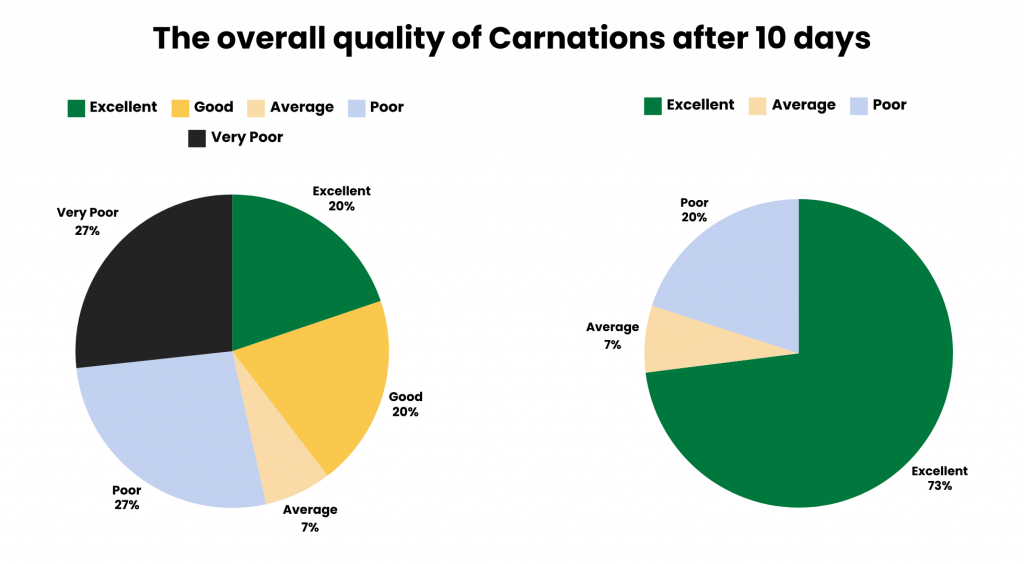Vibrant colors make carnations well known and widely popular. Yet, they are also prone to rapid deterioration and have a short vase life. Vidre+™ technology offers an effective and environmentally friendly solution to slow down the ripening process on carnations. After 10 days of tests, 73% of carnations treated with Vidre+™ maintained excellent quality compared to only 20% of the untreated ones. Fresh Inset’s technology can extend the vase life of carnations and help reduce waste across the floral industry.
The market for carnations was worth $564M in 2022. According to “The Biology of Carnation” by the Australian Department of Health: “carnations have been the third most traded flower (both import and export) during the five years from 2014 to 2018, behind rose and chrysanthemum.”
“Carnations are one of the most popular flowers, and they are susceptible to ethylene, often resulting in premature flower drop and affecting quality. Our technology aims to neutralize the negative effects of ethylene gas, prolonging the vase life of cut carnations, reducing waste, and addressing environmental challenges. Carnations are currently often treated with Silver to mitigate the effects of ethylene, an environmentally harmful solution.” — states Peter Vriends, Fresh Inset COO.
Testing carnations
The Dutch Flower lab researched how Vidre+™ technology can affect cut carnations. In a detailed study, five varieties of Carnations — red, white, yellow, pink, and dark red. Vidre+™ stickers were applied inside the flower sleeve, just below the flowers. Then flowers were shipped by sea freight from Kenya to the Netherlands
The test included 10 days-long vase-life simulation in carefully controlled conditions, under time-lapse cameras.
Results
The test results after 10 days revealed a significant reduction in ethylene sensitivity in flowers treated with Vidre+™ compared to untreated ones.

- Control Group: 20% of flowers demonstrated excellent, with 27% poor and 27% in very poor condition
- 10 cm² Vidre+™: 73% of flowers demonstrated excellent, 7% average and only 20% in poor quality.
Vidre+™ helps maintain carnations in excellent condition for longer. Tests proved it extended petal longevity, improved color retention, and reduced wilting. By extending the vase life of cut flowers throughout the supply chain, Vidre+™ also reduces the amount of unsold or discarded flowers, minimizing flower waste.
Carnations treated with Vidre+™ exhibit:
- Prolonged Freshness
- Improved Aesthetic
- Reduced Waste
Summary
Carnations, after roses and orchids, are the third species of flowers that can be successfully protected by Vidre+™. Research confirms that Fresh Inset’s technology may have a significant impact on the floral industry, making it possible to transport flowers for a longer distance and better answer consumer needs by providing protected and long-lasting flowers.
Vidre+™TM is the breakthrough next-generation application of 1-MCP technology, which exponentially expands the benefits of produce preservation by mitigating the effects of ethylene. The research conducted on 5 continents proves that the technology works on various crops and varieties from avocados to grapes, limes, pears, tomatoes, peppers, and many more. Vidre+™ brings a timed and gradual release mechanism that allows produce to be treated by 1-MCP directly in packaging, eliminating the need for a 24-hour application in a sealed storage room or air-tight containers. Available as coated stickers, labels, and films, the technology enables the use of 1-MCP on all produce and opens up types of produce that are known to respond to 1-MCP, but have not received the benefit due to the application limitations of 1st generation of 1-MCP products (which have immediate release and need to be applied in airtight storage for 24 hours or airtight packaging).
*DISCLAIMER
The results presented in this press release are based on a single conducted study. Please note that these are preliminary findings. Additional studies may provide further insights and perspectives.
**Source: Research report: 50000837-538-02 conducted by a Flower Lab in the Netherlands, Date: February 2023
***Other sources: OEC.WORLD
